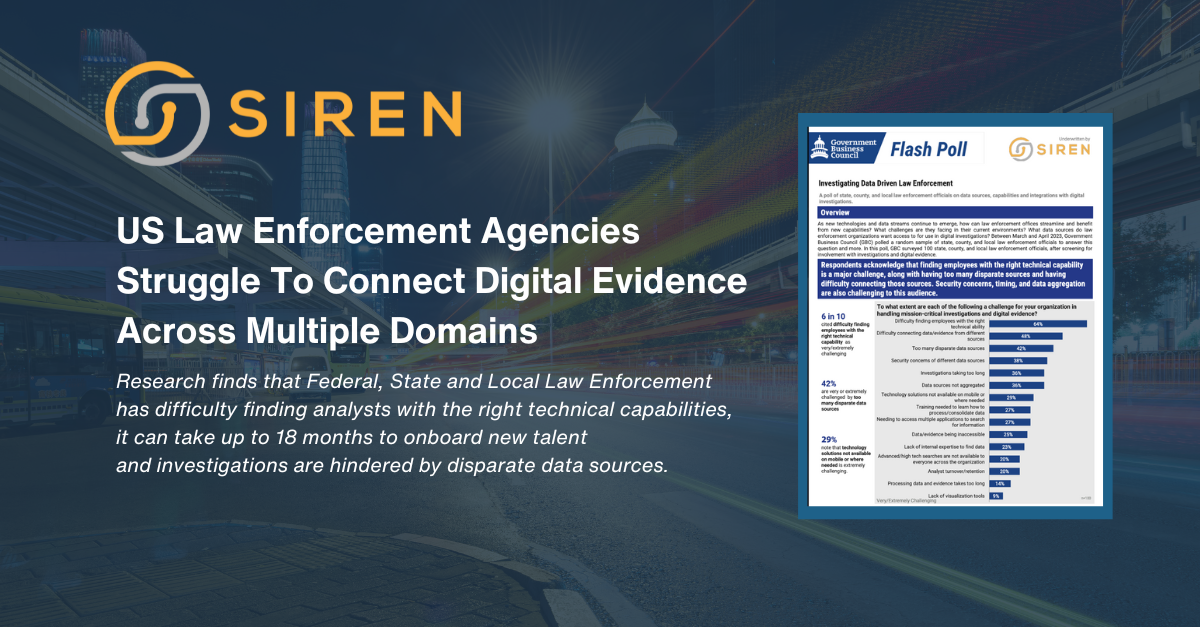Research finds that Federal, State and Local Law Enforcement has difficulty finding analysts with the right technical capabilities, it can take up to 18 months to onboard new talent and investigations are hindered by disparate data sources.

WASHINGTON, DC, May 17, 2023 – Siren, the investigations technology firm, on a mission to keep people, assets and networks safe, today released findings of a Flash Poll conducted by the Government Business Council (GBC) focused on the challenges faced by US law enforcement agencies when they undertake digital investigations. The research found that 64% of respondents are finding it increasingly difficult to attract employees with the right technical skills, and 42% are very or extremely challenged by an excess of disparate data sources and are having difficulty in connecting those sources. Overall, this data shows that security concerns, timing, and data aggregation were ongoing challenges for law enforcement as new technologies and data streams emerge.
Trouble connecting digital evidence and making data links
The most crucial part of an investigation is finding connections among suspects, gangs, targets and accomplices in disparate data, enabling an analyst to find a lead or solve a case. Almost half of those polled experience difficulty connecting evidence across data sources or creating data linkages.
A need to process more and more data
Investigative analysts need to achieve the right educational foundation and cultivate the right skill set in today’s technology heavy world. More than 50% of respondents state that it takes at least six months for a new analyst to become productive once onboarded thus emphasizing the importance of retention in law enforcement organizations. As the complexity of crime increases, law enforcement must deal with an increasing number of data sources and tools in investigations. During an average week respondents analyze as many as 7.5 different sources of data, and seven in ten use social media monitoring/analysis data. Despite that high number, given the opportunity, respondents would use an additional three sources if they had access, showing a desire for broader access to incorporate more sources in digital investigations.
In terms of more specific sources, nearly a third of those polled said they would utilize license plate reader and dark web data if available to them and nearly a quarter want to utilize dark web threat intelligence data, incident based National Criminal Justice Info Sharing Exchange, and threat awareness sources.
Sensitivity remains around the use of AI
Despite the recent hype surrounding artificial intelligence, those responsible for deploying AI-based solutions in law enforcement are reluctant to use it. Nearly half (48%) of those polled say their organizations are “not at all willing” to deploy an AI-based artificial solution for data consolidation, visualization and analysis. Concerns such as data privacy and security are cited as barriers to adoption. Crucially, law enforcement is required to ensure that decisions around guilt or innocence are entirely human and not automated.
Respondents, however, did recognize the potential benefits of adopting AI to help consolidate data sources and provide visualization tools, with the expectation that it would improve data accuracy and save money. In fact, 57% of respondents indicated that the two primary benefits for adopting an AI-based solution would be that more investigators would be able to conduct high tech searches while also having the ability to find, visualize and report on missing links across different data sources.
Bob Griffin, Chairman of Siren, said: “The results of this report really highlight what we see every day with our customers. Analysts are using an increasing number of data sources and tools to perform research and create links in their data. Unfortunately, cases are still being abandoned or taking too long to solve.”
Bob added: ”Data linkage technology, sadly, is still inaccessible for the vast majority of organizations and analysts are overwhelmed which is leading to dissatisfaction in their jobs. On top of that it is taking an unreasonable period of time to onboard new analysts and requires a unique profile to train the rest of the team. That makes it expensive, which is compounded because these people are in short supply.”
Survey Background
Underwritten by Siren and conducted by the Government Business Council (GBC), the research took place during March and April 2023, polling a random sample of Federal/National, State, Regional, Local, Municipal, and City Law Enforcement officials. All respondents are actively employed in cybersecurity, financial crimes investigation, intelligence collection/analysis, or law enforcement at their organization in order to participate. Four in ten respondents are involved in federal law enforcement while nearly six in ten are members of state or local law enforcement organizations. Respondents were screened for their primary responsibility in investigations at their organizations. Three quarters of respondents are in senior leadership positions at their organization.
The full report can be downloaded here.
About Siren
Siren is a complete investigation solution, safeguarding people, assets and networks. Siren fuses data from open source, vendor and classified sources allowing analysts and investigators to analyze risks, threats and crimes for the National Security, Public Safety, Fraud and Compliance, and Cyber Threat communities. Siren’s patented technology is uniquely search based providing the user with easy to use search, analytics, visualization and reporting capabilities for investigations on all data types at all scales of data volume.
In November 2022, Siren was included in the Deloitte Technology Fast 50. Siren was named as a Gartner Cool Vendor in an Analytics and Data Science Report in 2020. For more information, visit www.siren.io.
About Government Business Council
As GovExec’s research division, the Government Business Council (GBC) is dedicated to advancing the business of government through analysis, insight, and analytical independence. An extension of Government Executive’s 50 years of exemplary editorial standards and commitment to the highest ethical values, GBC studies influential decision makers from across government to produce intelligence based research and analysis.



